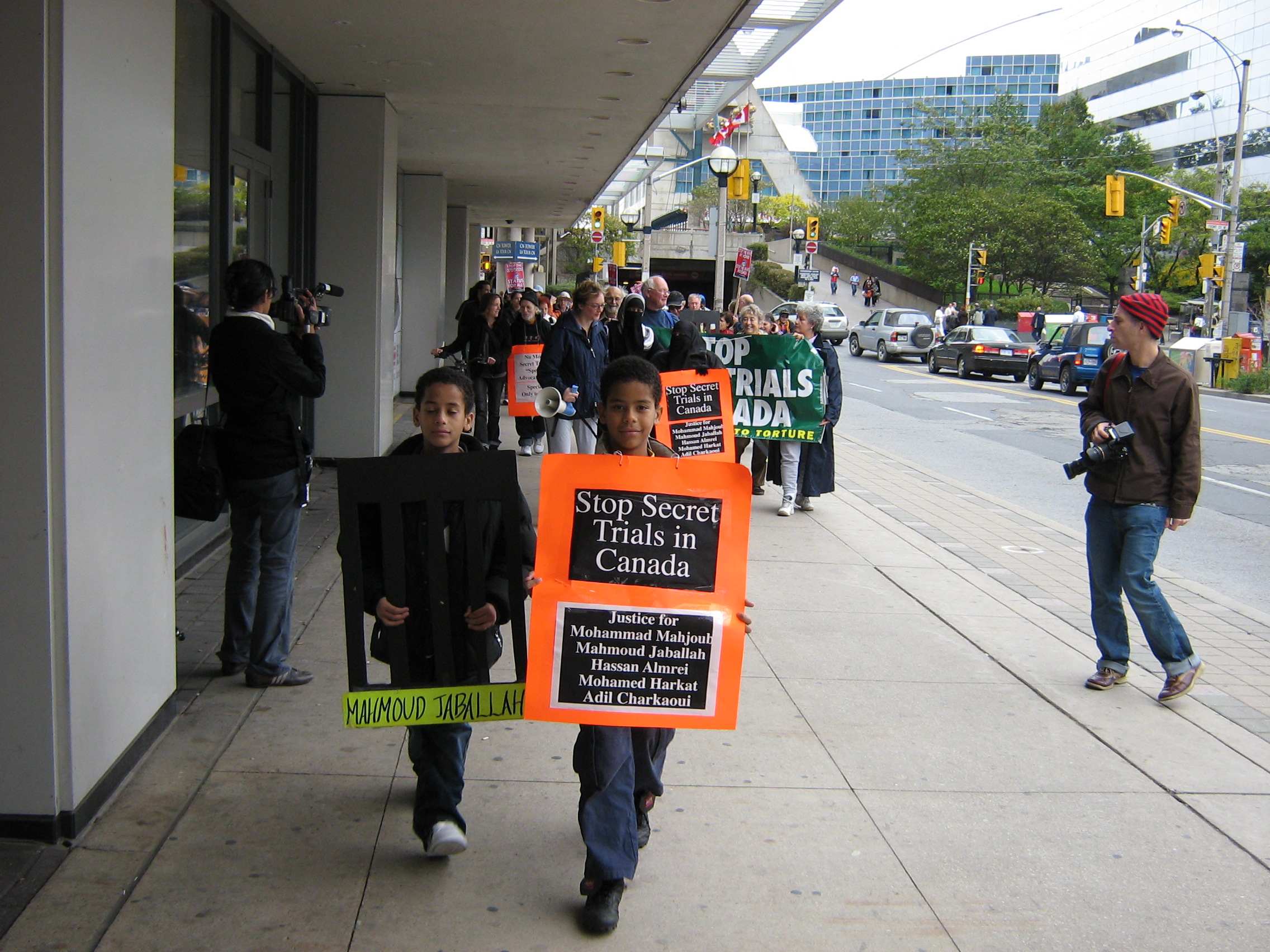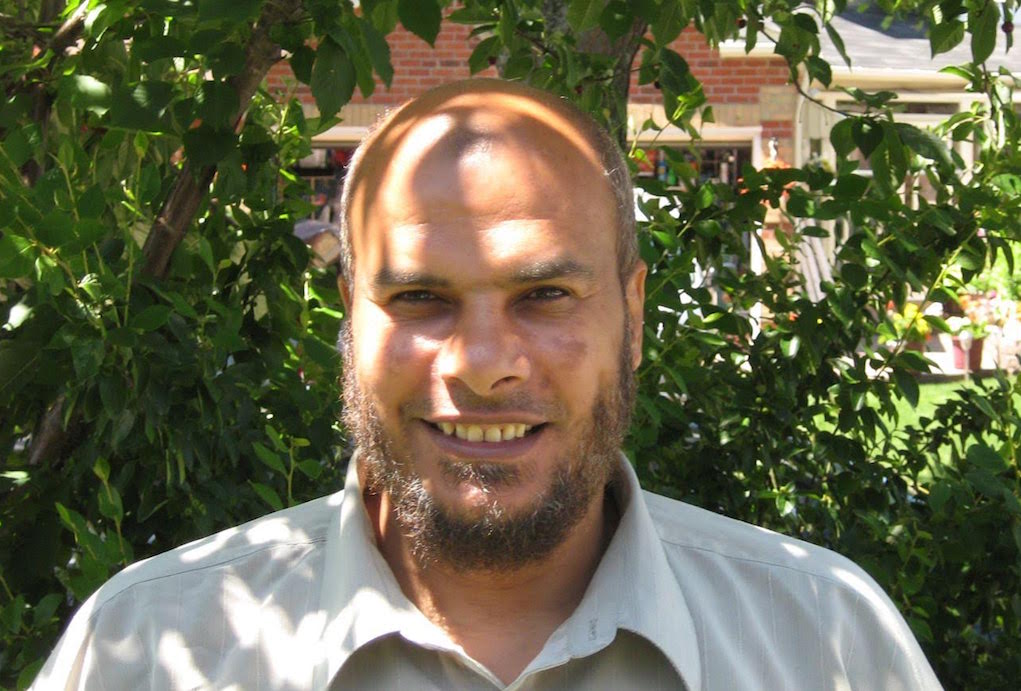Like this article? rabble is reader-supported journalism. Chip in to keep stories like these coming.
In a major setback to a Liberal government still refusing to repeal the repressive Bill C-51, the Federal Court has found unreasonable the secret trial security certificate against the long-suffering Mahmoud Jaballah, almost 20 years to the day that the Egyptian refugee and his family arrived in Canada seeking asylum from the Mubarak dictatorship. While the written decision for this finding has yet to be released, this hopefully brings to a close an 18-year legal fight that helped spur an international campaign of condemnation against Canada’s use of secret trials, indefinite detention, deportation to torture, and the patently illegal practices conducted by Canada’s spy agency, CSIS.
Jaballah, who was jailed without charge and tortured on many occasions in Egypt (as was his wife, Husnah, who was twice detained and tortured in front of him), was originally arrested in 1999 under the much-criticized security certificate, alleging he was a threat to national security. The problem he faced? He was not allowed to see the secret case against him in a process that allowed as evidence anything not normally admissible in a court of law. CSIS had originally approached him to spy on his community, and he refused. The response of CSIS was clear: co-operate or you will be jailed and deported to torture.
CSIS caught lying
Jaballah’s then 11-year-old son, Ahmad, was forced to translate through his own tears one very late night for the CSIS interrogators, whose own translator had fallen asleep and was snoring on the couch well after midnight. Young Ahmad could not sleep anyhow: their family of eight lived in a small two-bedroom Scarborough apartment where the noise of the interrogation kept everyone up. While CSIS agents confidently terrorized Jaballah, they were unaware that Ahmad and his mother had placed a tape recorder in the hallway, figuring it might come in useful. Sure enough, when CSIS was examined in open court much later on about whether they were in the business of extortion and threats, they of course denied that they could ever engage in such an odious practice. When the tape was produced, it went a long way towards obliterating any “credibility” CSIS may have had in the case, and in an almost unprecedented historical moment, the certificate was thrown out after Jaballah spent some seven months in detention.
But the nightmare did not end there. As is standard CSIS practice, the spy agency continued asking about Jaballah in the community, putting out the word that they would get him. In August 2001, while leaving the school where he was a principal and his wife a teacher, Jaballah was surrounded by heavily armed RCMP agents whose high-risk takedown was as unnecessary as it was baseless. Once again back in jail, Jaballah was behind bars during the 9/11 attacks, and would not be able to hug his kids for another eight years. At the first public portion of the secret trial in the fall of 2001, a CSIS agent admitted there was no new evidence against Jaballah, only a new interpretation of the old information that had already been thrown out by the Federal Court as unreliable.
Jaballah faced horrific times behind bars, with long years in solitary confinement, hunger strikes, untreated medical conditions, and the pain of a family growing up without him while fending off terror allegations that could never be disproven because they were secret.
Deprivations of justice
Along the way, the severe deprivations of justice that were the core of the process — originally solidified under the Trudeau government in the 1970s — produced some remarkable zingers that were accepted at face value by a series of Federal Court of Canada judges (all of whom would later learn that they were lied to behind closed doors). In one instance, a CSIS lawyer argued that Jaballah was a terrorist communications relay expert because when he came to Canada, he not only wasted no time in setting up a Bell phone account, but also carried a cell phone with him while his wife was pregnant, “procured” a fax machine (because Arab Muslims don’t simply purchase, they “procure,” usually with eerie music playing in the background), and started learning to surf the Internet. Readers with such skills: beware, you may be next.
In another instance, CSIS alleged without foundation that Jaballah was in touch with an overseas terrorist leader because some calls were allegedly made to a suspicious satellite phone from payphones within a four-kilometre radius of Jaballah’s home, which at the time was situated in the densely populated Toronto suburb of Scarborough.
Birthing a campaign
I got to know the Jaballah family shortly after his second arrest, and it was here that the Campaign to Stop Secret Trials in Canada was born, still fighting 15 years later for an end to the barbaric secret trial process and deportation to torture. It has been a long journey for the men, their families, and communities who live in fear that one of their loved ones could be next. Things really began to turn around in 2003 when the secret trial families started speaking with each other and to the media about their ordeal, and the narrative changed from “terrorist threat” to “secret trial detainees who deserved due process.”

Photo: Matthew Behrens
Supporters spent years in court on hard benches as heinous allegations were hurled at their loved ones in the docket, while some of Canada’s top lawyers, including Barbara Jackman, John Norris, Paul Copeland, Rocco Galati (who won the first case) and Marlys Edwardh waded through mountains of litigation trying to declare the process unconstitutional (a battle that was won with a unanimous Supreme Court decision in 2007. Celebrations were short-lived, though, as the Harper Conservatives teamed up with the Liberals to support continued use of secret trials, with some window dressing amendments). There were scores of street demonstrations, sympathy hunger strikes, long-distance walks, lobbying missions to Ottawa, jail sleepouts, and civil disobedience, all of which put a human face on one of this country’s most regressive and repressive policies. A fund started by the sons of Julius and Ethel Rosenberg (murdered by the U.S. government as Red Scare sacrifices) to aid the children of detainees contributed to the costs of Ahmad Jaballah’s tuition. With people from coast to coast writing letters to and visiting with Jaballah and other detainees known as the Secret Trial Five, it got to the point where CSIS Director Jim Judd threw up his hands in disgust, complaining these alleged threats were being treated as folk heroes.
Along the way, any glimmer of hope was always dashed with an equal measure of judicial reticence and compliant media, who continually repeated allegations with no factual basis and refused to ever challenge the court when a judge would say “we’re going into closed session.” Yet the media would fight to open up the same court when one of the detainees asked for private details of their lives to be kept out of the public realm when they felt their lives or those of loved ones were at risk. Even when two of the cases were dismissed — one case (Adil Charkaoui) withdrawn when the government refused to comply with an order to produce some classified information, the other (Hassan Almrei) a victory in which the CSIS case was found unreasonable — the government continued its campaign of selective leaks and community innuendo against the men. In the age of Google, it doesn’t matter if you win against CSIS: the taint of the allegation is forever available to anyone who opens a computer screen.
Meantime, Ottawa’s Mohamed Harkat and Toronto’s Mohammad Mahjoub, whose cases were found “reasonable” by Federal Court judges who relied on secret information that could not be challenged, are now fighting deportation to torture in Algeria and Egypt, respectively.
While the Campaign to Stop Secret Trials was ultimately successful in stopping the use of secret trial security certificates — none have been issued in over a decade — many of the court precedents in their cases have been used to insert more secrecy into refugee proceedings and other aspects of government control of targeted communities. Indeed, the process was lifted word for word into C-51 under a number of sections. But as Public Safety Minister Ralph Goodale considers a review of state security, he would do well to look at the weakness of these cases and the human damage they did to the detainees and their loved ones, all of whom will suffer the ill effects of the past two decades long into the future.
Judge makes mistake
In the spring of 2003, the second certificate (the one issued in 2001) was upheld against Jaballah on flimsy grounds as well as ON secret information neither he nor his lawyer ever got a chance to see, much less cross-examine. That set in motion the deportation process, in which the Liberal government of the day (with Immigration Minister Denis Coderre playing an odious role) found that Jaballah faced a substantial likelihood of torture or death if deported to Egypt, but recommended he be sent anyhow for the “safety” of Canadians. Coderre approved his department’s callous finding that:
“Mr. Jaballah has been detained apart from his children for some time; I cannot therefore conclude that Mr. Jaballah’s removal from Canada would deprive his children of his emotional and financial support any more than his current detention has.”
One of Jaballah’s legal challenges at the time focused on a section of the immigration act that made him and fellow detainees the only people in Canada who were prohibited from applying for bail. It made Federal Court Judge MacKay wonder aloud one day at the end of a long hearing whether Toronto had its own version of Guantanamo Bay.
The danger of the secret trial process, in which one side sat in secret with a judge, was revealed one day in 2006. We were shocked when, sitting in court, Judge MacKay admitted: “It looks like I made a mistake,” in reference to his use of a piece of “evidence” that was one of the key reasons he employed to conclude in May, 2003 that the government’s second security certificate against Jaballah was “reasonable.” It turns out, in fact, that this “evidence” did not exist. Three years of Jaballah’s life were spent behind bars in part due to this “mistake.”
Gitmo North
After the process was unanimously declared unconstitutional by the Supreme Court in 2007, the Federal Court, working with an Ottawa professor, worked diligently not to abolish the practice and raise the standards, but to introduce security-cleared “special advocates” who have some access to some of the case. But the detainees had no more clues about the reasons for their detention. While held at the notorious Guantanamo North facility in Kingston, Jaballah and his fellow detainees remained on punishing hunger strikes of between 80 and 160 days, eventually released under some of the most draconian bail conditions in Canadian history, turning families into jailers. Children needed approval from the government to have friends over to the house; a trip to the grocery store involved applying for permission a week in advance. All of this was duly recorded by the CBSA, and shared with CSIS, both agencies admitting this was necessary to continue their investigations, including the logging of solicitor-client calls.

Photo: Matthew Behrens
Jaballah is now a grandfather many times over. His remarkably resilient family has seen the worst of Egypt and of Canada. Last week, they celebrated the good news, which still felt like a dream. While it is a major stake in the heart of the secret trial process, it is not the end of the line. Mohammad Mahjoub of Toronto and Mohamed Harkat of Ottawa continue fighting deportation to torture after their cases were upheld based on secret information that is not normally admissible in a court of law that they were never allowed to see, much less contest.
We have much work still to do on these and so many other cases, but for now, a brief pause, and a celebration. At long last.
Matthew Behrens is a freelance writer and social justice advocate who co-ordinates the Homes not Bombs non-violent direct action network. He has worked closely with the targets of Canadian and U.S. ‘national security’ profiling for many years.
Like this article? rabble is reader-supported journalism. Chip in to keep stories like these coming.



